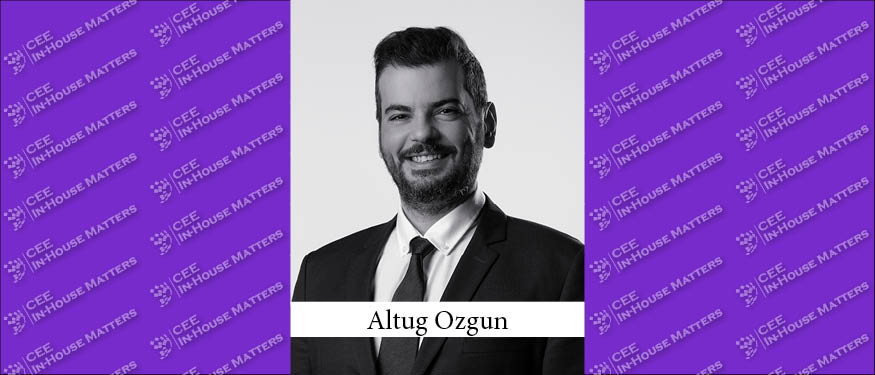The role of Internal investigations in an effective compliance program remains critical despite the significant impact of the COVID-19 outbreak and resulting work-from-home set-ups. Altug Ozgun, Ethics & Compliance Director, explains how he runs them for Astellas Pharma.
CEEIHM: Tell us a bit about your career leading up to your current role.
Altug: Thanks for this opportunity. I have worked as in-house counsel and a Legal and Compliance Director, representing multinational organizations, throughout my career – spanning over 15 years. The sectors I have been responsible for include pharma, medical devices, insurance, investment, real estate, and telecommunications. I’m currently focused on compliance, healthcare law, data privacy, employment and corporate law issues.
CEEIHM: How has the COVID-19 outbreak impacted your work as a GC?
Altug: As legal and compliance professionals, our role is to adopt proactive measures and calculate the risks in a dynamic working environment. However, no one has foreseen such a tragic pandemic and the paralyzing business effects it brings.
At first it was seen as a temporary period, then later we all had to adapt to a “new normal” and drive additional measures like working from home, social distancing, and other precautions to provide social health and employee well-being.
I think one lesson we have learned is to adapt to uncertainty and act quickly during crisis times. In Turkey and neighbouring countries we have lived with crisis, so legal and compliance professionals working here may be considered more immune to this. We have had to adapt ourselves to a new daily routine where digital meetings and the need for quick consultation has increased. As Franklin Roosevelt once said: “A smooth sea never made a skilled sailor.” So this process has led legal and compliance professionals to be more skilful sailors during this journey.
CEEIHM: Let’s talk about internal investigations. How does one normally run in your company, and how has the current situation impacted that?
Altug: Internal investigations are among the core elements of an effective compliance program and a defense mechanism for the corporation in fighting misconduct. According to the ACFE 2020 fraud report, 43% of all frauds are detected through tips by whistleblowers. Accordingly speak-up systems and internal investigations are still the best methods to proactively mitigate corporate scandals.
To give you an example, say we receive a serious complaint on bribery through our speak-up line. The first step would be to respond to the whistleblower, assuring him/her that the speak-up has been received and collect more information about the claim. The next step should be to abide by the internal reporting rules and assess whether external legal and finance consultation is needed. The third would be to collect evidence from relevant departments within the organization while maintaining confidentiality on a “need-to-know” basis. The next step should be planning an investigation team, investigation tools, timing, and logistics. After that the investigator should use every tool available –including, but not limited to conducting interviews – and finalize the investigation with a report which includes a root-cause analysis and recommendations for remediation actions.
Due to the ongoing COVID-19 crisis this was one of the questions: How can we conduct these internal investigations? The speak-up lines are used more frequently during pandemic times. This is due to concerns about human resources and employee well-being measures. However, this was also a time for the employees to stay distant from their daily routines and observe their environment. So, whistleblowing cases saw an increase, while companies shifted to more mobilized approaches to protect the health and safety of employees. Accordingly, corporations have been faced with a dilemma as to the right way of conducting internal investigations.
CEEIHM: What tools have you been using to meet these challenges?
Altug: Every corporation which deals with internal investigations has faced similar problems and reviewed their initial investigations protocol to meet these new challenges. For internal investigations, usually the governing bodies are legal and/or compliance functions. During this time, marked by the pandemic crisis, compliance functions have started to interact more with Human Resources, Workplace Safety, Finance, and similar departments. The first decision to consider is: Can we postpone this investigation until the new normal is established? If the allegation is very serious and involves a potentially high risk to the corporation and there is no option but to conduct the investigation, then the second question should be how to gather relevant data within the organization during distance-working times.
It’s important to use data analytics and access evidence gathering platforms within the company by legal and/or compliance professionals. So, this was a test for corporations which had already set up such internal capabilities because while distance-working, it is hard to communicate with other functions within the company and collect necessary information required for the investigation.
A third consideration would be to look at the internal interview process, as this is a crucial part of the internal investigation and, during the pandemic, it was impossible for the interviewers to conduct physical meetings. This was also a challenge for the interviewers as they have been trained to conduct in-person interviews and digital interviews are completely different. It becomes very limiting to not be able to observe the interviewee’s responses and body language and evaluate credibility while maintaining confidentiality. It’s also a critical to get a legal opinion if either party would like to record the interview as evidence during an electronic or telephone-based interview process.
CEEIHM: What lessons have you learned from this process – how do you expect it will influence the way you run internal investigations post-COVID-19?
Altug: The limitations of remote interviews may be used by the interviewees for their advantage. The interviewee may dial off from the interview as a tactic to gain time or get help from other people for crucial questions. Investigators should also be mindful of how to ask interviewees for documentation during interviews. If the investigators choose to ask about documents not before but during the interview the interviewee can also share his/her desktop, but the investigators should also consider data privacy legislation and get a legal opinion for this route. The remote interview process also possesses a significant risk in terms of the jurisdiction of the interviews if the interviewees are in different countries. The investigator should also think about different legal requirements in other jurisdictions, not only in terms of data privacy but also attorney-client privilege issues whenever the interviewee would like to consult his/her lawyer during the interview.
In summary, it’s wortwhile to say that before conducting a remote interview/investigation, corporations need to think about the different aspects – both technical and legal, and to consider the human resources aspect for these interviews. It would be a best practice to train the investigators for remote interviews and to get the necessary legal opinions and run a test before the interview, to be prepared for these challenges.


